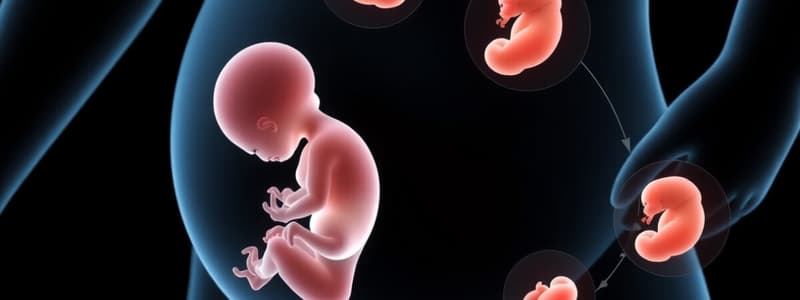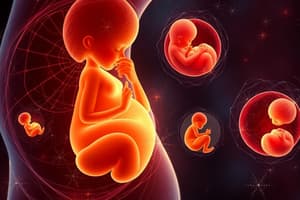Podcast
Questions and Answers
At what stage of fetal development is the heart fully formed?
At what stage of fetal development is the heart fully formed?
- Embryonic stage
- Zygotic stage
- Ovular stage
- Fetal stage (correct)
What is the primary characteristic of the embryonic stage of development?
What is the primary characteristic of the embryonic stage of development?
- Growth and refinement of structures
- Establishment of the circulatory system
- Development of sensory functions
- Formation of major organs (correct)
Which structure is crucial for nutrient exchange between the mother and fetus during the fetal stage?
Which structure is crucial for nutrient exchange between the mother and fetus during the fetal stage?
- Umbilical cord
- Placenta (correct)
- Amniotic sac
- Chorion
Which phase comes directly after the zygotic stage in fetal development?
Which phase comes directly after the zygotic stage in fetal development?
What is a significant feature of the fetal stage compared to earlier stages?
What is a significant feature of the fetal stage compared to earlier stages?
Flashcards are hidden until you start studying
Study Notes
Stages of Fetal Development
- Fetal development occurs in three main trimesters throughout pregnancy, each marked by specific growth milestones.
- The first trimester is crucial for organ formation; by week 12, most major organs have developed.
- The second trimester sees significant growth; the fetus begins to move, and features like hair, nails, and external genitalia appear.
- By the end of the second trimester, the fetus can respond to stimuli and has developed a heartbeat that can be heard.
- The third trimester is characterized by rapid weight gain and development of body systems; the fetus becomes viable outside the womb.
- Fetal development is monitored through ultrasound, which can assess growth, amniotic fluid levels, and identify any potential anomalies.
Important Developmental Milestones
- By week 4, the heart begins to beat; brain and spinal cord development starts.
- By week 6, the eyes and ears are forming; muscle and skeleton begin to develop.
- At week 12, the fetus is about 2.5 inches long and begins to have distinct facial features.
- Weeks 16-20 mark increased fetal movement known as "quickening," and the fetus can hear sounds from outside.
- By week 28, the fetus can respond to light and sound, showcasing central nervous system maturity.
Factors Influencing Fetal Health
- Maternal health, nutrition, and lifestyle choices significantly impact fetal well-being.
- Exposure to teratogens (harmful substances) can lead to developmental defects; examples include alcohol, tobacco, and certain medications.
- Regular prenatal care helps ensure the health of both mother and fetus, allowing for early detection and management of potential issues.
Studying That Suits You
Use AI to generate personalized quizzes and flashcards to suit your learning preferences.




